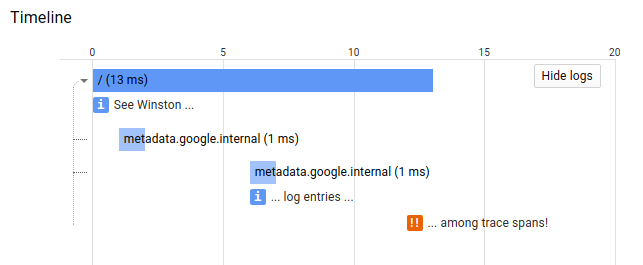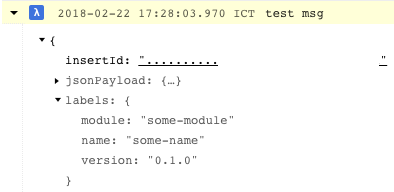@gameleap/logging-winston
v1.1.2
Published
Stackdriver Logging transport for Winston
Downloads
27
Maintainers
Readme
Stackdriver Logging for Winston: Node.js Client
This module provides a higher-level layer for working with Stackdriver Logging, compatible with Winston. Simply attach this as a transport to your existing Winston loggers.
- Stackdriver Logging for Winston Node.js Client API Reference
- Stackdriver Logging for Winston Documentation
- github.com/googleapis/nodejs-logging-winston
Read more about the client libraries for Cloud APIs, including the older Google APIs Client Libraries, in Client Libraries Explained.
Table of contents:
Quickstart
Before you begin
- Select or create a Cloud Platform project.
- Enable the Stackdriver Logging for Winston API.
- Set up authentication with a service account so you can access the API from your local workstation.
Installing the client library
npm install @google-cloud/logging-winstonUsing the client library
const winston = require('winston');
// Imports the Google Cloud client library for Winston
const {LoggingWinston} = require('@google-cloud/logging-winston');
const loggingWinston = new LoggingWinston();
// Create a Winston logger that streams to Stackdriver Logging
// Logs will be written to: "projects/YOUR_PROJECT_ID/logs/winston_log"
const logger = winston.createLogger({
level: 'info',
transports: [
new winston.transports.Console(),
// Add Stackdriver Logging
loggingWinston,
],
});
// Writes some log entries
logger.error('warp nacelles offline');
logger.info('shields at 99%');
For a more detailed Stackdriver Logging setup guide, see https://cloud.google.com/logging/docs/setup/nodejs.
Creates a Winston logger that streams to Stackdriver Logging
Logs will be written to: "projects/YOUR_PROJECT_ID/logs/winston_log"
Using as an express middleware
NOTE: this feature is experimental. The API may change in a backwards incompatible way until this is deemed stable. Please provide us feedback so that we can better refine this express integration.
We provide a middleware that can be used in an express application. Apart from being easy to use, this enables some more powerful features of Stackdriver Logging: request bundling. Any application logs emitted on behalf of a specific request will be shown nested inside the request log as you see in this screenshot:

This middleware adds a winston-style log function to the request object.
You can use this wherever you have access to the request object (req in the
sample below). All log entries that are made on behalf of a specific request are
shown bundled together in the Stackdriver Logging UI.
const lw = require('@google-cloud/logging-winston');
const winston = require('winston');
// Import express module and create an http server.
const express = require('express');
const logger = winston.createLogger();
async function main() {
// Create a middleware that will use the provided logger.
// A Stackdriver Logging transport will be created automatically
// and added onto the provided logger.
const mw = await lw.express.makeMiddleware(logger);
// Alternatively, you can construct a LoggingWinston transport
// yourself and pass it int.
// const transport = new LoggingWinston({...});
// const mw = await lw.express.makeMiddleware(logger, transport);
const app = express();
// Install the logging middleware. This ensures that a Winston-style `log`
// function is available on the `request` object. Attach this as one of the
// earliest middleware to make sure that the log function is available in all
// subsequent middleware and routes.
app.use(mw);
// Setup an http route and a route handler.
app.get('/', (req, res) => {
// `req.log` can be used as a winston style log method. All logs generated
// using `req.log` use the current request context. That is, all logs
// corresponding to a specific request will be bundled in the Stackdriver
// UI.
req.log.info('this is an info log message');
res.send('hello world');
});
// `logger` can be used as a global logger, one not correlated to any specific
// request.
logger.info('bonjour');
// Start listening on the http server.
app.listen(8080, () => {
logger.info('http server listening on port 8080');
});
}
main();Error Reporting
Any Error objects you log at severity error or higher can automatically be picked up by [Stackdriver Error Reporting][error-reporting] if you have specified a serviceContext.service when instantiating a LoggingWinston instance:
const loggingWinston = new LoggingWinston({
serviceContext: {
service: 'my-service', // required to report logged errors
// to the Google Cloud Error Reporting
// console
version: 'my-version'
}
});It is an error to specify a serviceContext but not specify serviceContext.service.
Make sure to add logs to your [uncaught exception][uncaught] and [unhandled rejection][unhandled] handlers if you want to see those errors too.
You may also want to see the [@google-cloud/error-reporting][@google-cloud/error-reporting] module which provides direct access to the Error Reporting API.
Formatting Request Logs
NOTE: The express middleware provided by this library handles this automatically for you. These instructions are for there case where you may want to handle this manually.
To format your request logs you can provide a httpRequest property as part of the log metadata you provide to winston. We will treat this as the [HttpRequest][http-request-message] message and Stackdriver logging will show this as a request log. Example:

winston.info(`${req.url} endpoint hit`, {
httpRequest: {
status: res.statusCode,
requestUrl: req.url,
requestMethod: req.method,
remoteIp: req.connection.remoteAddress,
// etc.
}
});The httpRequest property must be a properly formatted [HttpRequest][http-request-message] message. (Note: the linked protobuf documentation shows snake_case property names, but in JavaScript one needs to provide property names in camelCase.)
Correlating Logs with Traces
NOTE: The express middleware provided by this library handles this automatically for you. These instructions are for there case where you may want to handle this manually.
If you use [@google-cloud/trace-agent][trace-agent] module, then this module will set the Stackdriver Logging [LogEntry][LogEntry] trace property based on the current trace context when available. That correlation allows you to [view log entries][trace-viewing-log-entries] inline with trace spans in the Stackdriver Trace Viewer. Example:

If you wish to set the LogEntry trace property with a custom value, then set a winston metadata property for 'logging.googleapis.com/trace', which is exported by this module as LOGGING_TRACE_KEY. For example:
const winston = require('winston');
const {LoggingWinston} = require('@google-cloud/logging-winston');
// ...
winston.info('Log entry with custom trace value', {
[LoggingWinston.LOGGING_TRACE_KEY]: 'custom-trace-value'
});Specifying default labels in the constructor
You can specify labels when initiating the logger constructor.
// Creates a Winston Stackdriver Logging client
const loggingWinston = new LoggingWinston({
labels: {
name: 'some-name',
version: '0.1.0'
}
});
// Writes some log entries
logger.debug('test msg');
// you can also put some `labels` when calling the logger function
// the `labels` will be merge together
logger.debug('test msg', {
labels: {
module: 'some-module'
}
});The labels will be on the Log Viewer.

Add a prefix to easily identify logs
You can specify a prefix in the constructor, and that prefix will be prepended to all logging messages. This can be helpful, for example, to quickly identify logs from different modules in a project.
// Creates a Winston Stackdriver Logging client
const loggingWinston = new LoggingWinston({
prefix: 'some-module'
});
logger.debug('test msg');
Samples
Samples are in the samples/ directory. The samples' README.md
has instructions for running the samples.
| Sample | Source Code | Try it |
| --------------------------- | --------------------------------- | ------ |
| Quickstart | source code |  |
| Explicit Auth Setup | source code |
|
| Explicit Auth Setup | source code |  |
|
The Stackdriver Logging for Winston Node.js Client API Reference documentation also contains samples.
Versioning
This library follows Semantic Versioning.
This library is considered to be in beta. This means it is expected to be mostly stable while we work toward a general availability release; however, complete stability is not guaranteed. We will address issues and requests against beta libraries with a high priority.
More Information: Google Cloud Platform Launch Stages
Contributing
Contributions welcome! See the Contributing Guide.
License
Apache Version 2.0
See LICENSE



